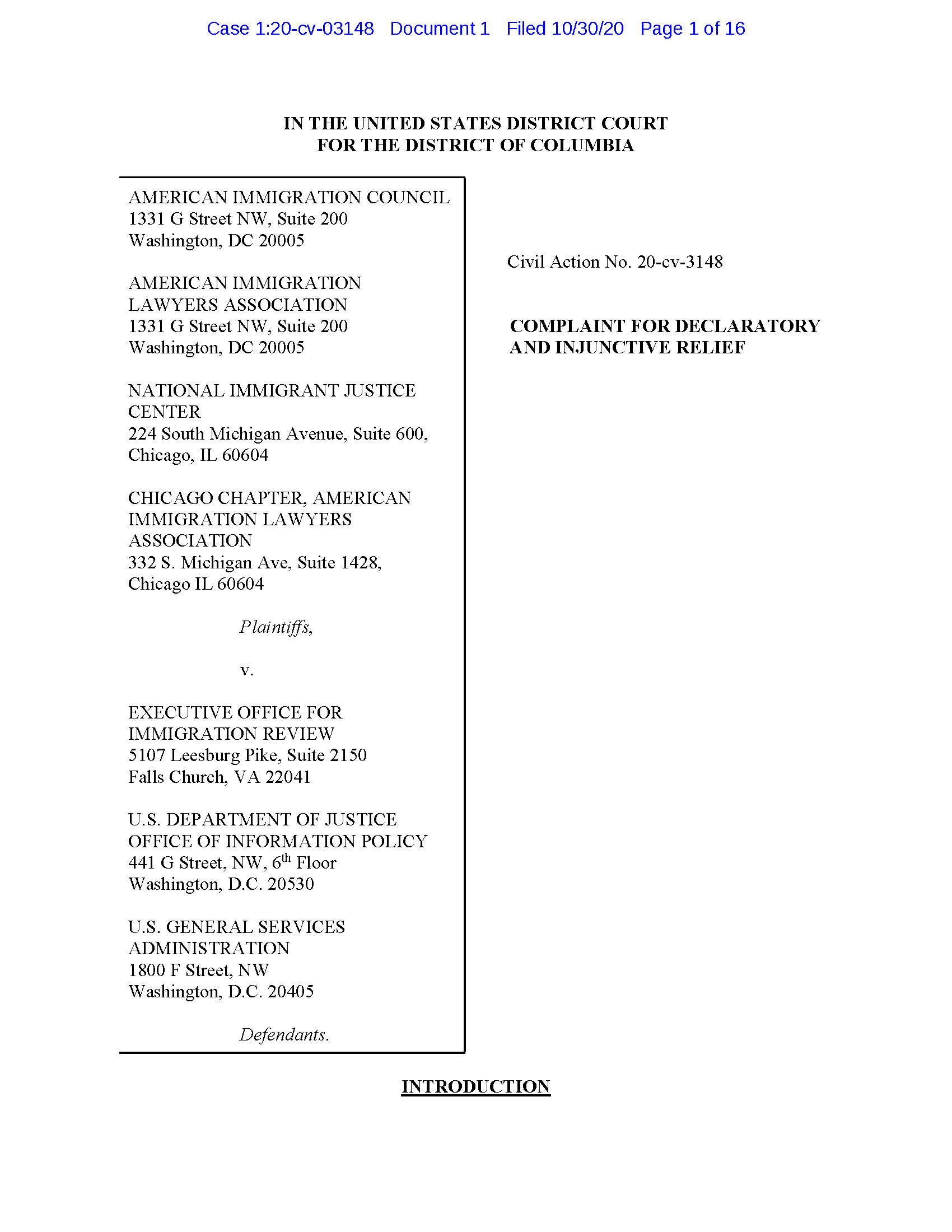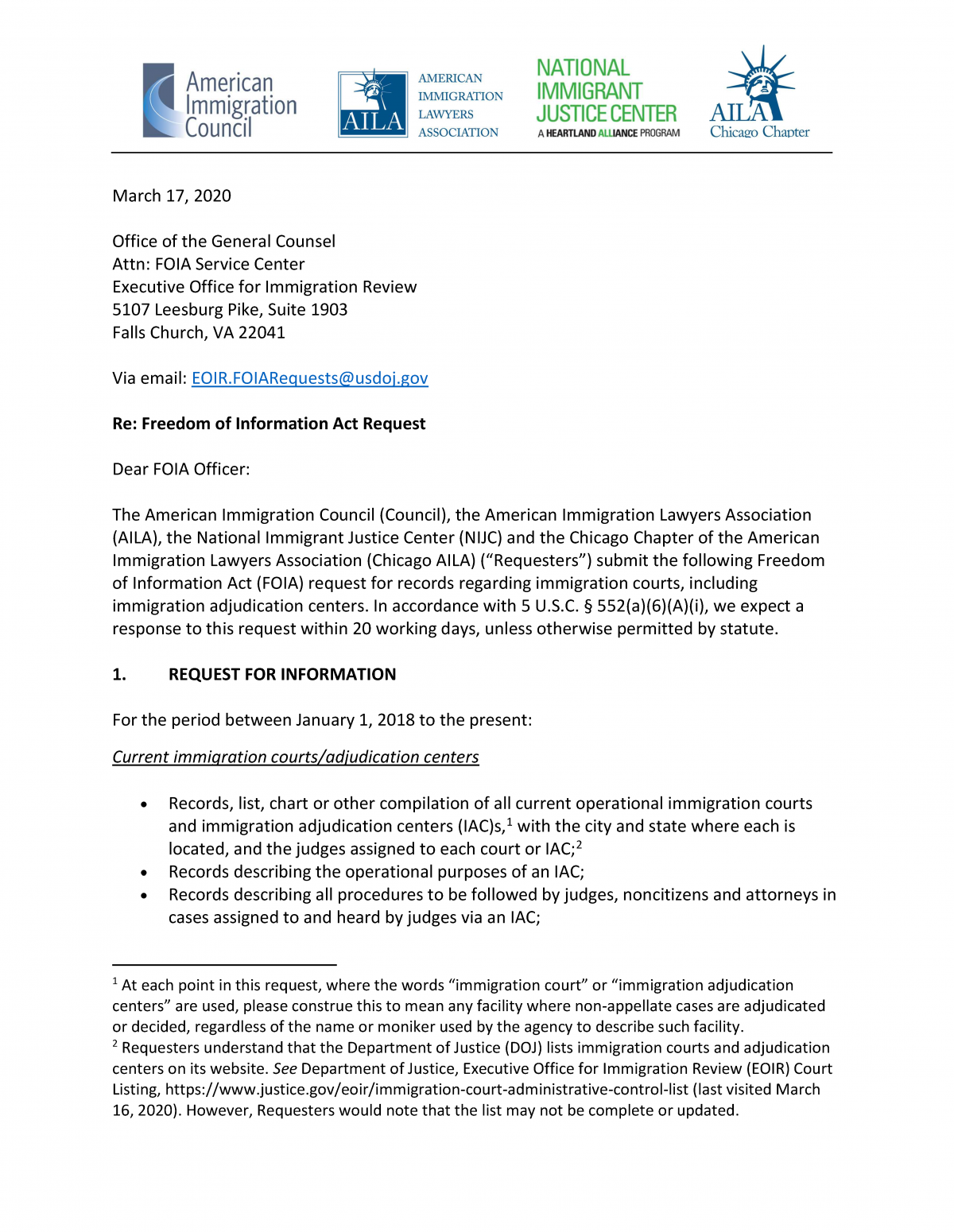- FOIA Litigation
Government Faces Lawsuit for Failing to Disclose Information on Expansion of Immigration Courts and Immigration Adjudication Centers
Under the Trump administration, the Executive Office for Immigration Review (EOIR) undertook an expansion of immigration courts and instated the concept of immigration adjudication centers (IAC). But the government provided little information to the public about these initiatives—including the location and relevant procedural rules in some instances.
Despite concerns about this secret court expansion, it is not clear if plans to expand the courts will change under the Biden administration.
What are immigration adjudication centers and why are there concerns?
Public information about the location and expansion of these courts and centers is critically important. These entities are tasked with hearing and deciding hundreds of removal proceedings each year, determining whether individuals will face deportation from the United States or be permitted to remain.
EOIR’s purported aim in expanding courts and creating IACs is to address backlogs. However, media reports and direct observation by advocates and practitioners raise concerns that these efforts instead amount to the facilitation of assembly-line justice where cases are rapidly funneled with little oversight or regard for due process.
Immigration lawyers and advocates have expressed concerns after public reports indicate the potential expansion of immigration courts and immigration adjudication centers across the country, which almost exclusively rely on the use of video teleconferencing which creates further due process concerns.
Why was this Freedom of Information Act (FOIA) request filed?
The American Immigration Council and partners filed a Freedom of Information Act request in order to disclose records on the expansion of the courts and IACs, obscure procedural rules for immigration adjudication centers and to obtain contracts for existing and proposed sites. However, the agency failed to disclose critical information about what immigration courts presently exist, immigration court expansion, and contracts governing this expansion.
The lawsuit was filed by the American Immigration Council, American Immigration Lawyers Association, the Chicago AILA Chapter, and the National Immigrant Justice Center in District Court for the District of Columbia.
What records did the government release?
EOIR released over 200 pages in response to our FOIA lawsuit. The documents reveal, for the first time, that EOIR plans to expand immigration courts—including IACs—to at least five other locations. The expansion locations include Chicago, IL; Northern Virginia; Orange County, CA; and two in Houston, TX.
See the government records on DocumentCloud. Notable documents related to court expansion include:
- An October 2019 request for lease proposals for a new site in Orange County, CA.
- A June 2020 request for lease proposals for a new site in Chicago, IL.
- A January 2019 request for lease proposals for a new site in Houston, TX.
- A March 2020 request for lease proposals for another new site in Houston, TX.
- A March 2019 request for lease proposals for a new site in Northern Virginia.
- A March Court Report indicating multiple new leased court locations that are scheduled to be complete in the spring, summer, and fall of 2021. The new locations listed include:
- Orange County, CA
- Virginia suburbs
- Chicago area
- Boston area
- Maryland suburbs
- Laredo, TX
- Bay area of California
- A chart with “Active” EOIR Projects detailing lease status, square footage, location, and acquisition type.
- A chart with court locations identified by region, lease number, address, building name, and building number.
Other released records relate to immigration adjudication centers, policies addressing use of immigration courtrooms, and caseloads. These documents include:
- Intake Guidelines for the Fort Worth IAC and the Falls Church IAC, including what matters should be handled by those Centers.
- A worksheet to be filled out when a merits case is ready to be transferred to an IAC.
- A backgrounder on the EOIR Strategic Caseload Reduction Plan.
- An EOIR memorandum, No Dark Courtrooms, describing how EOIR can better utilize courtrooms to ensure that none are unused, or dark. Strategies outlined in the memo include employing immigration judges at IACs and using videoconference technology for hearings.


